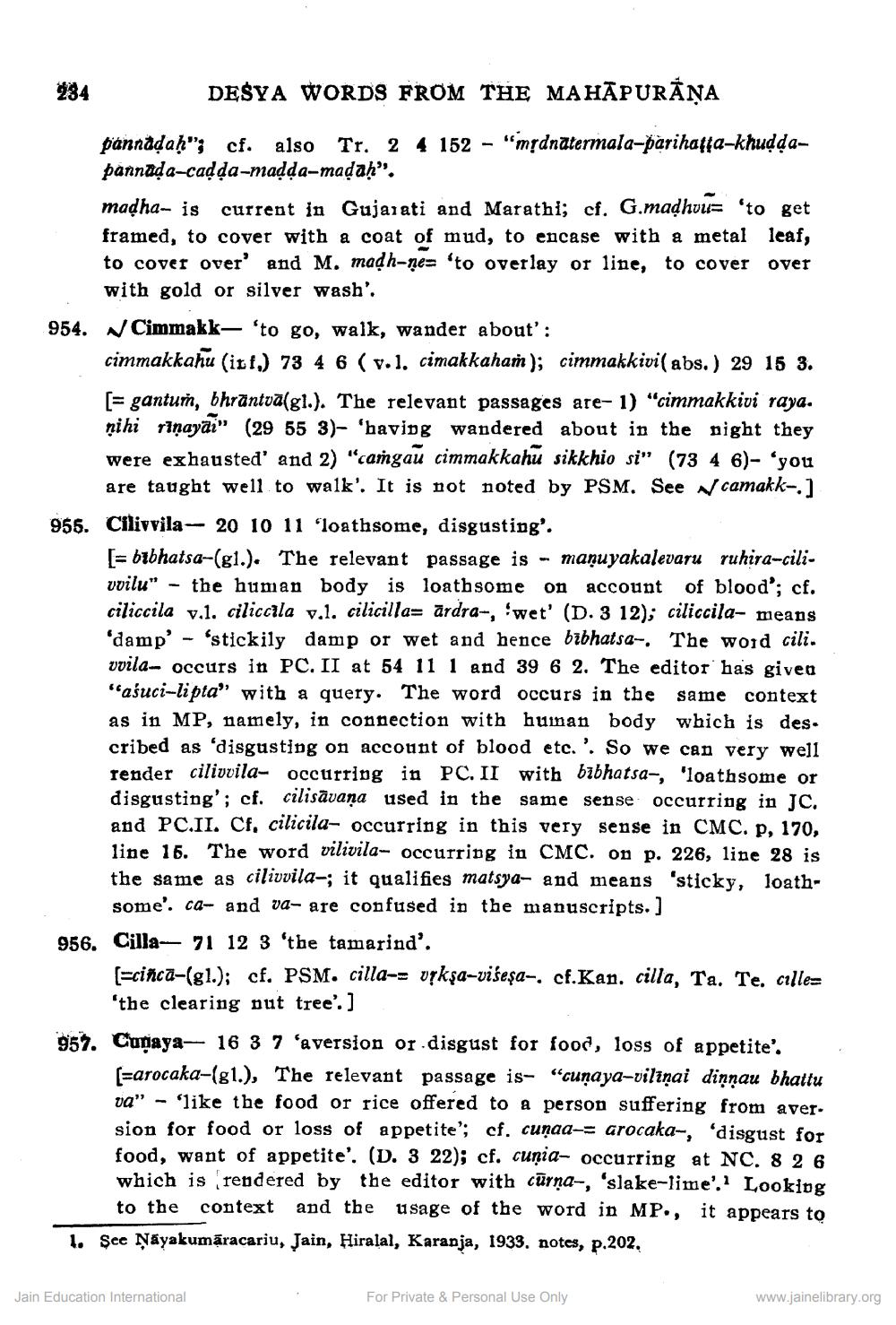________________
DESYA WORDS FROM THE MAHĀPURĀŅA
pannadah"; cf. also Tr. 2 4 18 2 - "mşdnatermala-parihaffa-khuddaþannada-cadda-madda-madah”. madha- is current in Gujarati and Marathi; cf. G.madhvu= 'to get framed, to cover with a coat of mud, to encase with a metal leaf, to cover over' and M. madh-ne= 'to overlay or line, to cover over
with gold or silver wash'. 954. ^ Cimmakk- 'to go, walk, wander about':
cimmakkahu (itt,) 73 4 6 ( v.1. cimakkaham); cimmakkivil abs.) 29 15 3. (= gantun, bhrāntva(gl.). The relevant passages are-1) "cimmakkivi raya. ņihi riņayai" (29 55 3)- 'having wandered about in the night they were exhausted' and 2) "camgau cimmakkahū sikkhio si" (73 4 6)- 'you are taught well to walk'. It is not noted by PSM. See camakk-. )
956. Cilivvila -- 20 10 11 "loathsome, disgusting'.
[= bibhatsa-(gl.). The relevant passage is - manuyakalevaru ruhira-cilivvilu" - the human body is loathsome on account of blood'; cf. ciliccila v.1. ciliccila v.1. cilicilla= ārdra-, wet' (D. 3 12); ciliccila- means damp' - 'stickily damp or wet and hence bibhatsa-. The word cili.
- occurs in PC. II at 54 11 1 and 39 6 2. The editor has given "asuci-li pta" with a query. The word occurs in the same context as in MP, namely, in connection with human body which is des. cribed as 'disgusting on account of blood etc.'. So we can very well render cilivvila- occurring in PC. II with bibhatsa-, 'loathsome or disgusting'; cf. cilisävaņa used in the same sense occurring in JC. and PC.II. Cf, cilicila, occurring in this very sense in CMC. P, 170, line 16. The word vilivila- occurring in CMC. on p. 226, line 28 is the same as cilivvila-; it qualifies matsya- and means 'sticky, loath
some'. ca- and va- are confused in the manuscripts. ] 956. Cilla- 71 12 3 'the tamarind'.
feciñca-(gl.); cf. PSM. cilla-- vykşa-višeşa-, cf.Kan. cilla, Ta. Te, cillez
'the clearing nut tree'. ] 95%. Cupaya- 16 3 7 'аversion or disgust for food, loss of appetite'.
(=arocaka-(g1.), The relevant passage is "cunaya-vilinai dinnau bhattu va" - like the food or rice offered to a person suffering from aver. sion for food or loss of appetite'; cf. cunaa-= arocaka-, 'disgust for food, want of appetite'. (D. 3 22); cf. cuņia- occurring at NC. 8 2 6 which is rendered by the editor with cūrņa-, 'slake-lime'. Lookiog
to the context and the usage of the word in MP., it appears to 1. See Nayakumāracariu, Jain, Hiralal, Karanja, 1933. notes, p.202.
Jain Education International
For Private & Personal Use Only
www.jainelibrary.org




